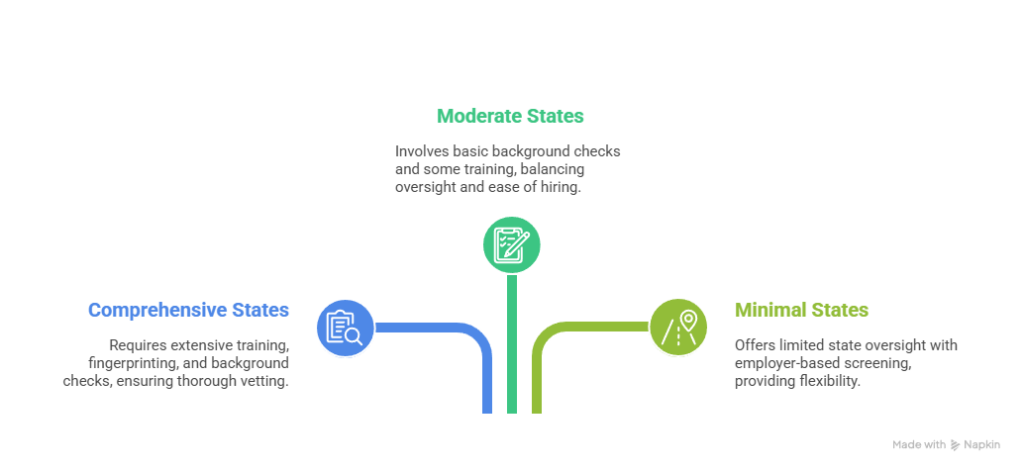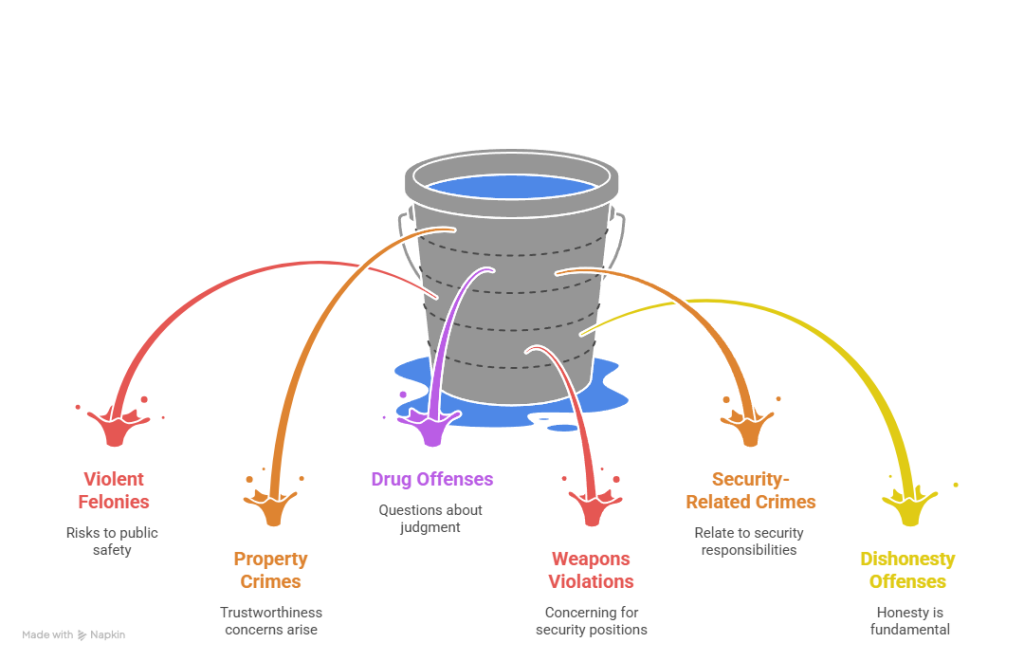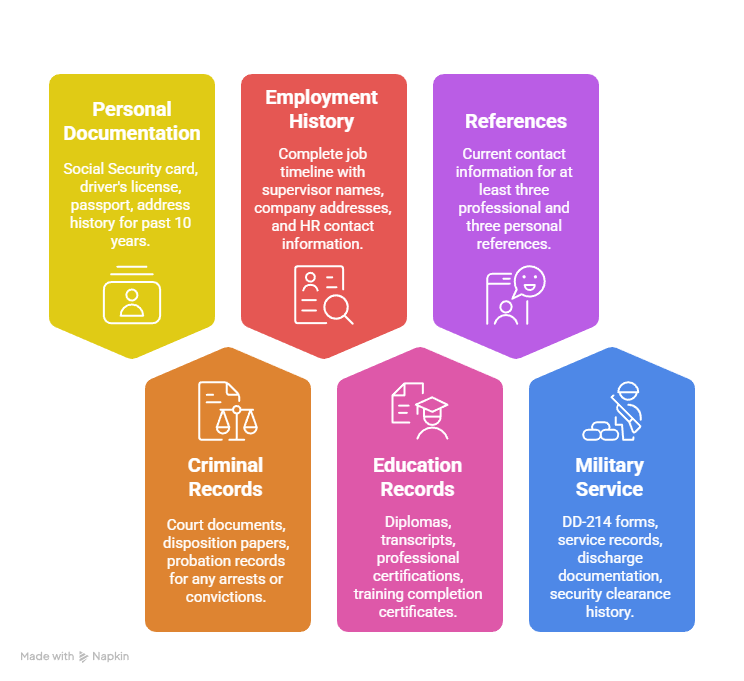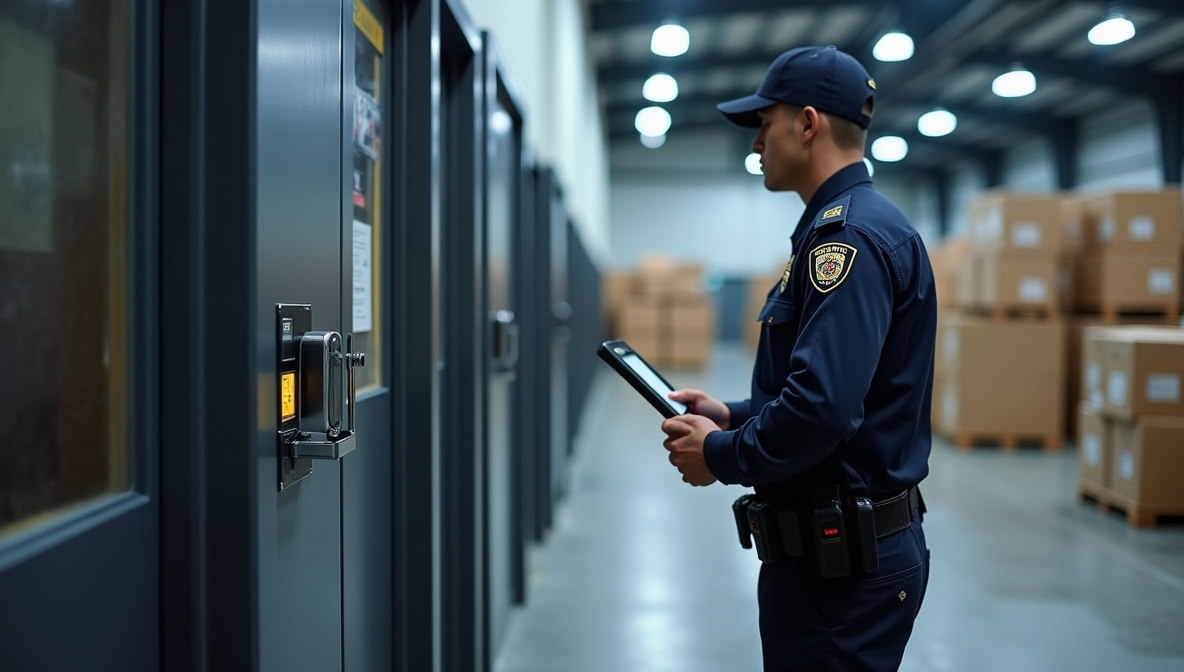Security guard background check requirements vary by state and position type, but typically include criminal history, employment verification, credit checks, and specialized screenings for armed positions. Understanding these requirements helps job seekers prepare properly and increases their chances of successful employment in the security industry.
Key Takeaways
- Criminal background checks extend 7-10 years and include federal, state, and local records for most security positions.
- Employment and education verification confirms work history, gaps, and relevant training credentials.
- Credit history screening is standard for positions involving cash handling, financial institutions, or high-security environments.
- Armed security positions require additional federal background checks, mental health screenings, and firearms proficiency testing.
- Fingerprinting and identity verification are mandatory in most states and involve FBI database searches.
- Professional reference checks validate character, work ethic, and suitability for security responsibilities.
Standard Security Guard Background Check Components
Security guard background check requirements encompass multiple verification layers designed to ensure candidate reliability and public safety. The security industry maintains strict screening standards due to the trust and responsibility inherent in these positions. Most employers conduct comprehensive checks regardless of whether state law mandates specific requirements.
The typical security background check process includes criminal history searches, employment verification, education confirmation, and reference checks. Additional screenings may include credit reports, driving records, and drug testing depending on the specific role. These components work together to create a complete picture of an applicant's background and suitability for security work.
Modern technology has streamlined many background check processes in 2025. Digital verification systems now provide faster results while maintaining accuracy. Automated database searches can cross-reference multiple sources simultaneously. This advancement reduces processing times significantly compared to previous years.
Criminal Background Investigation Process
Criminal background investigations form the cornerstone of security guard screening processes. These searches typically cover federal, state, and local criminal databases spanning 7-10 years, though some positions require lifetime criminal history reviews. Employers examine both felony and misdemeanor convictions, with particular attention to crimes involving violence, theft, dishonesty, or substance abuse.
The investigation process includes county courthouse searches, state criminal databases, and federal crime records. Many employers also conduct sex offender registry checks and terrorist watch list screenings. Pending charges and arrests without conviction may also appear in results, requiring case-by-case evaluation by hiring managers.
Employment and Education Verification Standards
Employment verification confirms previous job titles, dates of employment, reasons for leaving, and eligibility for rehire. Security companies pay special attention to employment gaps, frequent job changes, and termination reasons. Education verification ensures candidates possess claimed degrees, certifications, or specialized training relevant to security work. Professional licensing verification confirms any claimed security licenses, guard cards, or specialized certifications like CPR or first aid training.
State-Specific Security License Background Check Requirements
State licensing requirements for security guards vary significantly across jurisdictions in 2025. Some states require minimal screening while others mandate comprehensive background investigations. California, Texas, Florida, and New York maintain particularly strict licensing standards with detailed background check requirements. Understanding your state's specific requirements helps ensure compliance and successful license acquisition.
Most states require fingerprint-based background checks processed through state agencies and the FBI. The licensing process typically includes application fees, training requirements, and ongoing renewal obligations. Some states allow reciprocity for out-of-state security licenses, while others require complete re-licensing for new residents. Digital licensing platforms have become standard in 2025, making the application process more efficient.
Several states have updated their requirements in recent years to address emerging security threats. Enhanced screening protocols now include social media reviews and digital footprint analysis. These modern approaches help identify potential risks that traditional background checks might miss.
State Requirement Categories:

- Comprehensive States: California, Texas, Florida, New York - require mandatory training, fingerprinting, and extensive background checks
- Moderate States: Illinois, Pennsylvania, North Carolina, Georgia - require basic background checks and some training requirements
- Minimal States: Idaho, Wyoming, Montana - have limited state oversight with employer-based screening
State licensing agencies maintain databases of approved security personnel and can revoke licenses for criminal convictions or policy violations. Regular license renewals often require updated background checks and continuing education credits.
California Security Guard Background Check Process
California maintains one of the most stringent security guard licensing processes in the United States in 2025. The Bureau of Security and Investigative Services requires comprehensive background investigations including fingerprint processing, criminal history reviews, and character evaluations. Applicants must complete mandatory training programs and pass written examinations before receiving guard cards. The California process includes federal and state criminal history checks, employment verification, and moral character assessments.
Armed Security Background Check Requirements

Armed security positions require significantly more extensive background screening compared to unarmed security roles. Federal law mandates that armed security personnel meet strict criteria under the Private Security Officer Employment Authorization Act and various firearms regulations. These requirements ensure that individuals carrying firearms professionally demonstrate exceptional reliability and judgment. The armed security screening process includes psychological evaluations, mental health assessments, and domestic violence conviction reviews.
Candidates must also demonstrate firearms proficiency and complete specialized training programs. Many states require separate licensing for armed security personnel beyond basic guard cards. Armed security background checks examine military service records, discharge status, and any disciplinary actions. Federal background investigations often extend beyond standard timeframes and include interviews with references, neighbors, and former colleagues.
The process can take 30-90 days depending on the jurisdiction and position requirements. New federal guidelines implemented in 2024 have standardized many armed security screening procedures. These updates ensure consistency across different states and jurisdictions. Enhanced mental health screening requirements now include additional psychological assessments for high-risk positions.
Armed Security Screening Components:
| Component Type | Requirements |
| Federal Database Search | Comprehensive multi-agency criminal review |
| Psychological Evaluation | Mental health and stability assessment |
| Domestic Violence Check | Federal and state conviction search |
| Military Verification | Discharge status and service record review |
| Reference Investigation | Extended character and reliability assessment |
| Firearms Testing | Marksmanship and safety demonstration |
These enhanced requirements reflect the serious responsibility of carrying firearms in professional security roles.
Federal Background Investigation Standards
Federal background investigations for armed security personnel follow established protocols similar to those used for government security clearances. These investigations examine lifestyle factors, financial stability, foreign contacts, and potential vulnerabilities that could compromise security effectiveness. The process includes subject interviews and comprehensive record reviews. Investigators verify all information provided by applicants and conduct field investigations when necessary.
Security Officer Background Check Process Timeline
The security officer background check process typically takes 5-15 business days for standard positions in 2025. However, complex cases or armed security roles may require 30-45 days for completion. Processing times vary based on the number of jurisdictions searched, record availability, and verification complexity. Expedited services are available for urgent hiring needs, though they may cost additional fees.
Initial database searches usually complete within 24-48 hours, while employment and education verifications can take 3-7 days depending on former employer responsiveness. Criminal record searches involving multiple states or federal databases may require extended processing time. International background checks for foreign nationals can extend timelines significantly. Advanced AI-powered screening systems introduced in 2025 have reduced average processing times by 30% compared to previous years.
Processing Timeline Overview:
| Check Type | Standard | Expedited |
| Criminal History | 2-5 days | 24-48 hours |
| Employment Verification | 3-7 days | 1-3 days |
| Education Verification | 2-5 days | 24-48 hours |
| Complete Package | 5-15 days | 3-7 days |
Applicants can expedite the process by providing complete, accurate information and ensuring all contact details are current. Missing information or unresponsive references can significantly delay completion.
Factors That May Delay Background Checks
Several factors can extend security guard background check timelines beyond standard processing periods. Common delays include incomplete application information, unresponsive former employers, sealed or expunged records requiring court verification, and extensive criminal histories requiring detailed investigation. Applicants with frequent relocations may experience delays due to multi-jurisdictional searches.
International background checks, military service verification, and federal security clearance reviews often require extended processing time. Candidates should factor these potential delays into their job search timeline and maintain communication with potential employers about status updates. New blockchain-based verification systems are being tested in 2025 to reduce these delays.
What Disqualifies Someone From Security Work
Certain criminal convictions and background factors automatically disqualify individuals from security guard positions in 2025. Meanwhile, others require individual assessment and consideration. Felony convictions, violent crimes, theft-related offenses, and drug trafficking typically result in permanent disqualification. Misdemeanor convictions may be evaluated based on recency, relevance, and rehabilitation evidence.
Financial problems, including bankruptcies, excessive debt, or poor credit history, can disqualify candidates for positions involving cash handling or high-security environments. Mental health issues, substance abuse problems, and dishonesty during the background check process also commonly result in disqualification. Some disqualifying factors may be waived after specific time periods or with evidence of rehabilitation.
Recent updates to federal guidelines have clarified which offenses qualify for automatic disqualification versus case-by-case review. These changes provide more consistency across different employers and jurisdictions. Additionally, new rehabilitation pathways have been established for certain types of convictions.
Common Disqualifying Factors:

- Violent Felonies: Assault, domestic violence, robbery, homicide - these crimes indicate potential risks to public safety
- Property Crimes: Theft, burglary, embezzlement, fraud - these offenses suggest trustworthiness concerns for security personnel
- Drug Offenses: Trafficking, distribution, manufacturing - serious drug crimes raise questions about judgment and reliability
- Weapons Violations: Illegal possession, carrying, or use - firearms offenses are particularly concerning for security positions
- Security-Related Crimes: Trespassing, impersonating officers - these directly relate to security work responsibilities
- Dishonesty Offenses: Perjury, false statements, identity theft - honesty is fundamental to security work
Each state and employer maintains specific disqualification criteria, and some allow appeals or waivers under certain circumstances.
Rehabilitation and Appeal Options
Many states provide pathways for individuals with criminal histories to pursue security careers through rehabilitation programs, expungement processes, or formal appeals. Certificate of rehabilitation programs, pardons, and successful completion of probation may help overcome certain disqualifying convictions. Time elapsed since conviction, evidence of rehabilitation, and character references can influence appeal decisions. Some employers consider individual circumstances and may grant waivers for specific positions or under supervised conditions.
Industry-Specific Background Check Variations
Different security industry sectors maintain unique background check requirements reflecting their specific risks and regulatory environments in 2025. Healthcare security personnel often undergo additional health screenings and background investigations related to patient safety. Airport security workers must pass Transportation Security Administration (TSA) background checks and obtain Security Threat Assessments. Financial institution security requires enhanced credit checks, financial crime history reviews, and regulatory compliance verification.
Government contract security positions may require security clearances, polygraph examinations, and extended background investigations. Casino security involves gaming commission background checks and specialized screening for gambling-related issues. Technology sector security roles now include cybersecurity background checks and digital forensics reviews. These specialized requirements often involve additional costs, extended timelines, and ongoing monitoring obligations throughout employment.
Industry-Specific Requirements:
- Airport/Aviation: TSA Security Threat Assessment and aviation-specific training verification
- Healthcare: Health department screenings, patient abuse registry checks, HIPAA compliance verification
- Financial: Enhanced credit analysis, banking regulatory compliance, anti-money laundering background checks
- Government: Federal security clearances, polygraph testing, extensive lifestyle investigations
- Gaming/Casino: Gaming commission licensing, gambling addiction assessments, financial stability reviews
- Technology: Cybersecurity clearances, intellectual property background checks, digital footprint analysis
Each sector has developed increasingly sophisticated screening protocols to address modern security challenges. These requirements continue evolving as new threats emerge.
Healthcare Security Background Requirements
Healthcare security positions require specialized background checks addressing patient safety, HIPAA compliance, and medical facility security concerns. These screenings often include health department database searches, patient abuse registries, and verification of any medical-related licenses or certifications. Healthcare employers pay particular attention to convictions involving vulnerable populations, substance abuse, or healthcare fraud. Many healthcare facilities require annual background check updates, drug testing programs, and ongoing monitoring for criminal activity.
Preparing for Your Security Guard Background Check

Successful preparation for security guard background checks involves gathering required documentation, reviewing personal history for potential issues, and ensuring accuracy of all provided information. Candidates should obtain copies of their criminal history, employment records, and educational transcripts before beginning the application process. Honest disclosure of any background issues demonstrates integrity and allows employers to make informed decisions. Organizing personal information chronologically helps ensure accuracy and completeness during the application process.
Candidates should prepare explanations for employment gaps, address changes, or other irregularities that may raise questions. Having contact information readily available for all references, former employers, and educational institutions expedites the verification process. Digital document management has become essential in 2025, with most employers accepting electronic submissions through secure portals. Blockchain-based credential verification systems are increasingly being used to prevent document fraud.
New mobile apps launched in 2025 help candidates track their background check status in real-time. These platforms provide transparency and reduce anxiety during the waiting period. Some services also offer pre-screening tools that identify potential issues before formal submission.
Preparation Checklist:

- Personal Documentation: Social Security card, driver's license, passport, address history for past 10 years
- Criminal Records: Court documents, disposition papers, probation records for any arrests or convictions
- Employment History: Complete job timeline with supervisor names, company addresses, and HR contact information
- Education Records: Diplomas, transcripts, professional certifications, training completion certificates
- References: Current contact information for at least three professional and three personal references
- Military Service: DD-214 forms, service records, discharge documentation, security clearance history
Thorough preparation reduces processing delays and demonstrates professionalism to potential employers. Many candidates underestimate the importance of having complete documentation readily available.
Common Background Check Mistakes to Avoid
Applicants frequently make mistakes that can delay or derail their security guard background checks in 2025. Common errors include providing incorrect dates, omitting employment periods, failing to disclose criminal history, or providing outdated contact information for references. Inconsistencies between application information and background check results raise red flags about candidate honesty and attention to detail.
Another frequent mistake involves failing to properly explain gaps in employment or education, which can create suspicion about undisclosed activities. Candidates should be prepared to account for all time periods and provide documentation supporting their explanations when possible. Social media cleanup has become increasingly important as employers now review online presence as part of background screening.
Conclusion
Security guard background check requirements encompass comprehensive screening processes designed to ensure public safety and professional reliability in 2025. Understanding these requirements helps job seekers prepare effectively and increases their chances of successful employment in the security industry. The scope and depth of background checks vary based on position type, industry sector, and state regulations, with armed security roles requiring the most extensive screening. Technology continues revolutionizing the background check process, making it faster and more accurate while maintaining security standards.
Proper preparation, honest disclosure, and attention to detail are essential for navigating the background check process successfully. Candidates should research their state's specific requirements and gather necessary documentation well in advance of applying for security positions. While some background issues may be disqualifying, many states offer rehabilitation pathways and appeal processes for qualified individuals. The security industry continues evolving its screening standards to balance public safety concerns with fair employment practices.
Frequently Asked Questions
How long does a security guard background check take in 2025?
Standard security guard background checks typically take 3-10 business days in 2025 due to technological improvements, while armed security positions may require 20-35 days due to federal requirements and additional screenings.
What crimes disqualify you from being a security guard?
Violent felonies, theft-related crimes, drug trafficking, weapons violations, and dishonesty offenses typically disqualify candidates, though specific requirements vary by state and employer.
Do security companies check credit history?
Yes, most security companies include credit checks, especially for positions involving cash handling, financial institutions, or high-security environments where financial stability indicates reliability.
Can you be a security guard with a misdemeanor?
Many misdemeanor convictions don't automatically disqualify security guard candidates, but recent convictions or those related to violence, theft, or dishonesty may cause problems.
How far back do security background checks go?
Most security background checks cover 7-10 years of criminal history, though some positions require lifetime criminal record reviews, particularly for armed security roles.
What happens if you lie on a security guard background check?
Lying on a background check typically results in immediate disqualification and may prevent future employment in the security industry, as honesty is considered essential for security personnel.
Do security guards need fingerprints?
Most states require fingerprinting for security guard licensing, which enables FBI database searches and creates permanent records for ongoing monitoring purposes.
Can felons work in security?
Some states allow felons to work in security after specific waiting periods or through rehabilitation programs, but violent crimes and recent convictions typically result in permanent disqualification.
What documents do I need for a security background check?
Required documents typically include government-issued ID, Social Security card, employment history, education records, and contact information for references and former employers.
How much do security guard background checks cost in 2025?
Background check costs vary from $40-180 in 2025 depending on the scope of screening, with more comprehensive checks for armed positions typically costing more than basic unarmed security screening.
Do security background checks include drug testing?
Many security employers include drug testing as part of the hiring process, though it's technically separate from background checks and may involve ongoing random testing requirements.
Can you appeal a failed security background check?
Most states and employers provide appeal processes for background check failures, allowing candidates to dispute inaccurate information or explain mitigating circumstances affecting their results.
What shows up on a federal security background check?
Federal security background checks include FBI criminal databases, terrorist watch lists, immigration records, military service history, and federal court records nationwide.
Do security companies verify previous employment?
Yes, employment verification is standard practice and includes confirming job titles, employment dates, reasons for leaving, and eligibility for rehire with previous employers.
How often are security guard background checks updated?
Many employers conduct annual background check updates or ongoing monitoring, particularly for armed security positions or high-security facilities requiring current clearance status.
Additional Resources
- Bureau of Security and Investigative Services - Security Guard Licensing Requirements
https://www.bsis.ca.gov/consumers/security_guards.shtml - Private Security Officer Employment Authorization Act - Federal Requirements
https://www.fbi.gov/services/cjis/identity-history-summary-checks - International Association for Healthcare Security - Industry Standards
https://www.iahss.org/ - ASIS International - Security Industry Guidelines
https://www.asisonline.org/ - Transportation Security Administration - Airport Security Requirements
https://www.tsa.gov/for-industry/security-threat-assessments - National Association of Security Companies - Best Practices
https://www.nasco.org/ - Security Industry Association - Professional Standards
https://www.securityindustry.org/

GCheck Editorial Team
Meet the GCheck Editorial Team, your trusted source for insightful and up-to-date information in the world of employment background checks. Committed to delivering the latest trends, best practices, and industry insights, our team is dedicated to keeping you informed.
With a passion for ensuring accuracy, compliance, and efficiency in background screening, we are your go-to experts in the field. Stay tuned for our comprehensive articles, guides, and analysis, designed to empower businesses and individuals with the knowledge they need to make informed decisions.
At GCheck, we're here to guide you through the complexities of background checks, every step of the way.





